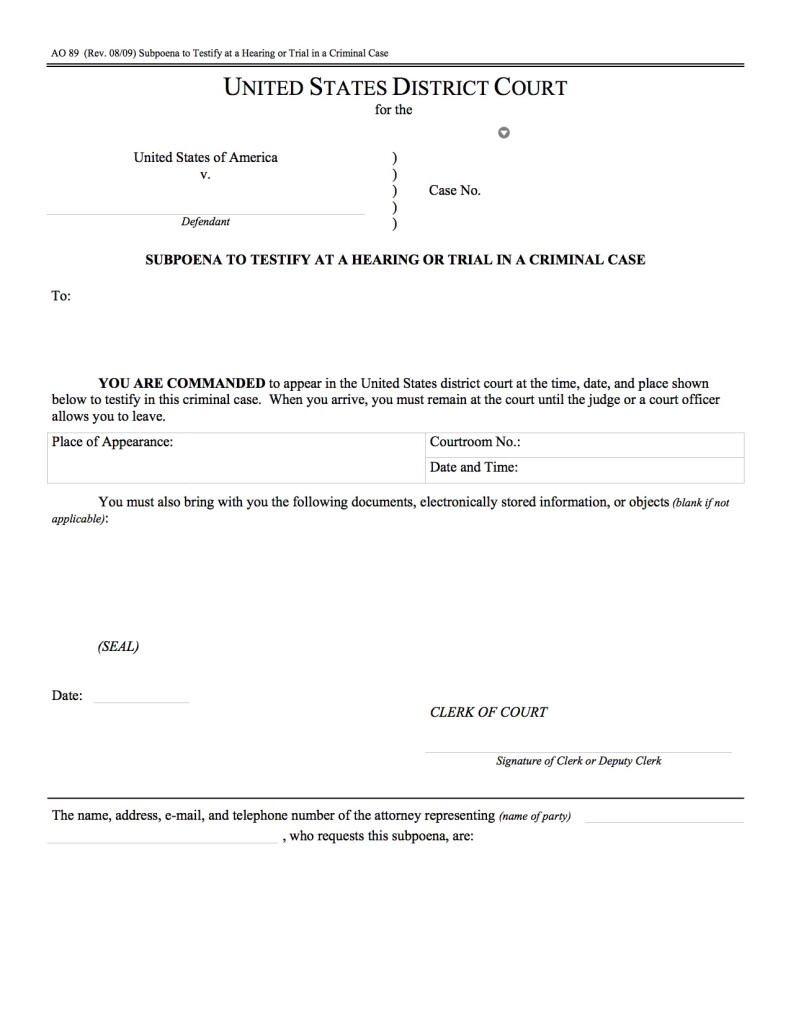Receiving a federal subpoena can be intimidating. If you receive a subpoena to testify at a grand jury, for example, you may be wondering: What is it that they want to ask me about? Could my statements or the information I provide in testimony get me in trouble and even lead to me being charged? Can I refuse to answer certain questions? What are my rights?
In this article, we provide information in response to some of the most common questions regarding federal subpoenas.
What is a federal subpoena?
In general, there are two kinds of subpoenas: subpoenas “ad testificandum,” which are subpoenas that order an individual to testify at a hearing, and subpoenas “duces tecum,” which order an individual to produce documents (either at a hearing, or, more commonly, make those documents available to the attorneys to a case before a hearing).
[Example of a federal subpoena from a criminal case]
Who issues federal subpoenas?
Subpoenas may be issued either by a court, an investigative body such as a grand jury, or sometimes by attorneys.
Grand jury subpoenas. Grand jury subpoenas are issued as a part of the grand jury’s investigation of criminal violations. The grand jury has significant power in deciding whom to subpoena and what to subpoena. These subpoenas can command witnesses to appear before the grand jury to provide testimony, or can require the production of documents or other tangible items to the grand jury. Failure to comply with grand jury subpoenas can have serious consequences.
Trial subpoenas. Trial subpoenas are issued by the court, although usually at the request of the prosecution or the defense. In federal courts, it is common practice for attorneys to obtain “blank subpoenas” before a trial or hearing, and to fill in the subpoenas with names and addresses of needed witnesses as a case progresses. Although the clerk of the court is required to provide blank subpoenas to the parties upon request, defendants will commonly make a motion for the court to issue subpoenas duces tecum.
Can a federal subpoena be challenged?
Yes. In some circumstances, a federal judge may limit, modify, or invalidate (“quash”) a subpoena. For example, the court may quash a subpoena if a subpoena calls on a witness to testify in violation of the Fifth Amendment right against self-incrimination, or to testify about information that is protected, such as attorney-client privileged information. Similarly, with subpoenas to produce documents, the court may modify a subpoena if it is overbroad or calls for materials that are protected. The process of challenging federal subpoenas requires significant skill and experience with the federal criminal process; it is important to work with an attorney who specializes in federal criminal defense to successfully navigate this process.
What if I don’t comply with a federal subpoena?
Failure to comply with a federal subpoena can have severe consequences. A court can sanction your failure to comply with a subpoena with contempt penalties. These penalties may include fines, or even jail time.
How can an attorney help me if I receive a federal subpoena?
Because the consequences of failing to comply with a subpoena are so dire, it is important to ensure that you do not find yourself in contempt of court for failing to comply. An experienced federal attorney will protect you from these serious consequences by clearly advising you as to your rights and obligations with respect to a subpoena. Your attorney can also take steps to make the process of complying the subpoena more manageable and fair.
A skilled federal lawyer will have the ability to negotiate the terms of a subpoena. For example, if a subpoena calls for a large number of irrelevant documents that are difficult and costly to produce, your attorney may be able to narrow the scope of the production to something much more reasonable and fair. Similarly, if the deadline for the production does not give you reasonable time to comply, your attorney can negotiate for more time.
Similarly, if you are called to testify before a grand jury, you attorney may be able to help you by explaining to prosecutors that the information they are seeking is protected. Your attorney may also arrange for a more information meeting or interview with prosecutors where your attorney can be present, rather than having you testify in a grand jury.
If negotiations fail and you are still subject to a subpoena that is unreasonable or unlawful, your attorney can bring these issues to the attention of the court. Because the court has the power to limit, modify or even defeat a subpoena, representation by a skilled attorney can make all the difference in this process.

